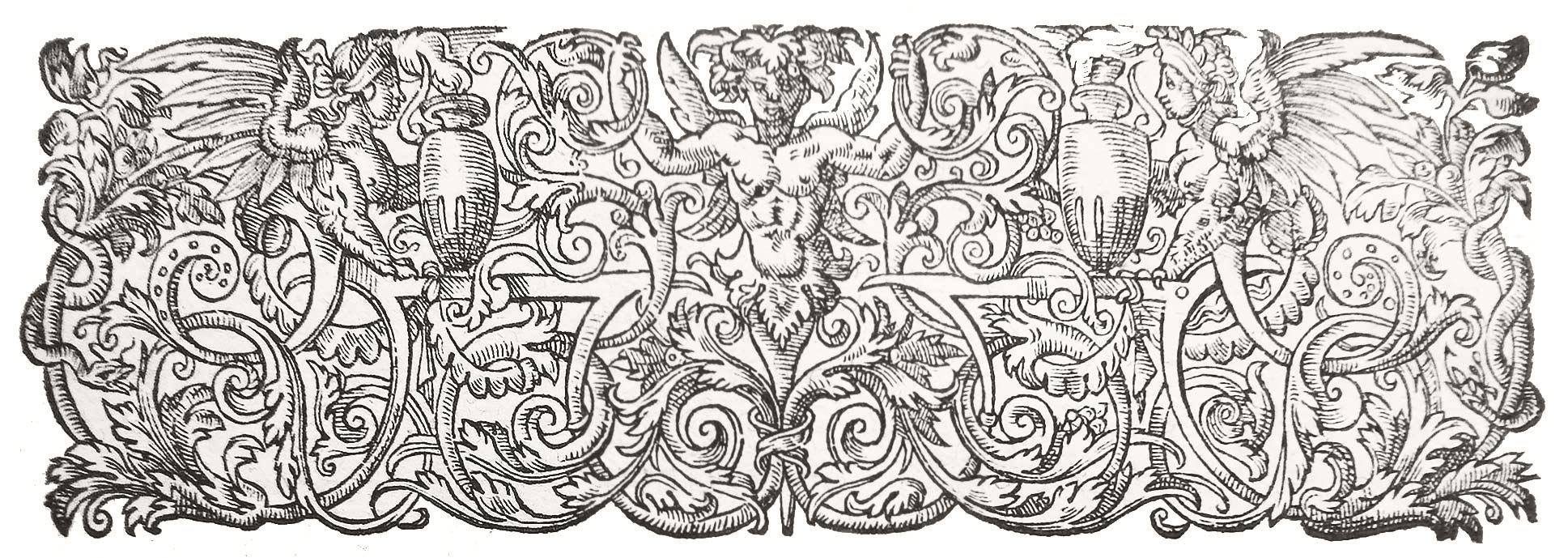
The Destruction Of Sodom.
Genesis 19. 24.
Then the Lord rained upon Sodom and Gomorrah brimstone and fire, from the Lord out of Heaven.
ABout five hundred years after Christ, when the vast Dominion of the Romans began to decline, there was a great affliction and trouble throughout the world ; plagues, famines, wars, earthquakes, and other evils conspired together to vex all places. The people of God, everywhere both in the Greek and Latin Churches, fearing their turn might be next to come under the scourge, had forms of holy Prayers composed by their Prelates, which the Greek Church called a Litanies and the Latin Rogations, to be spoken often into the ears of the Lord of heaven and earth, to prevent imminent judgements. The godly minded Christians of the old times knew that those calamities, if present, would cause the people to bewail with tears, and thus while still absent, they laboured by prayers to keep them away.
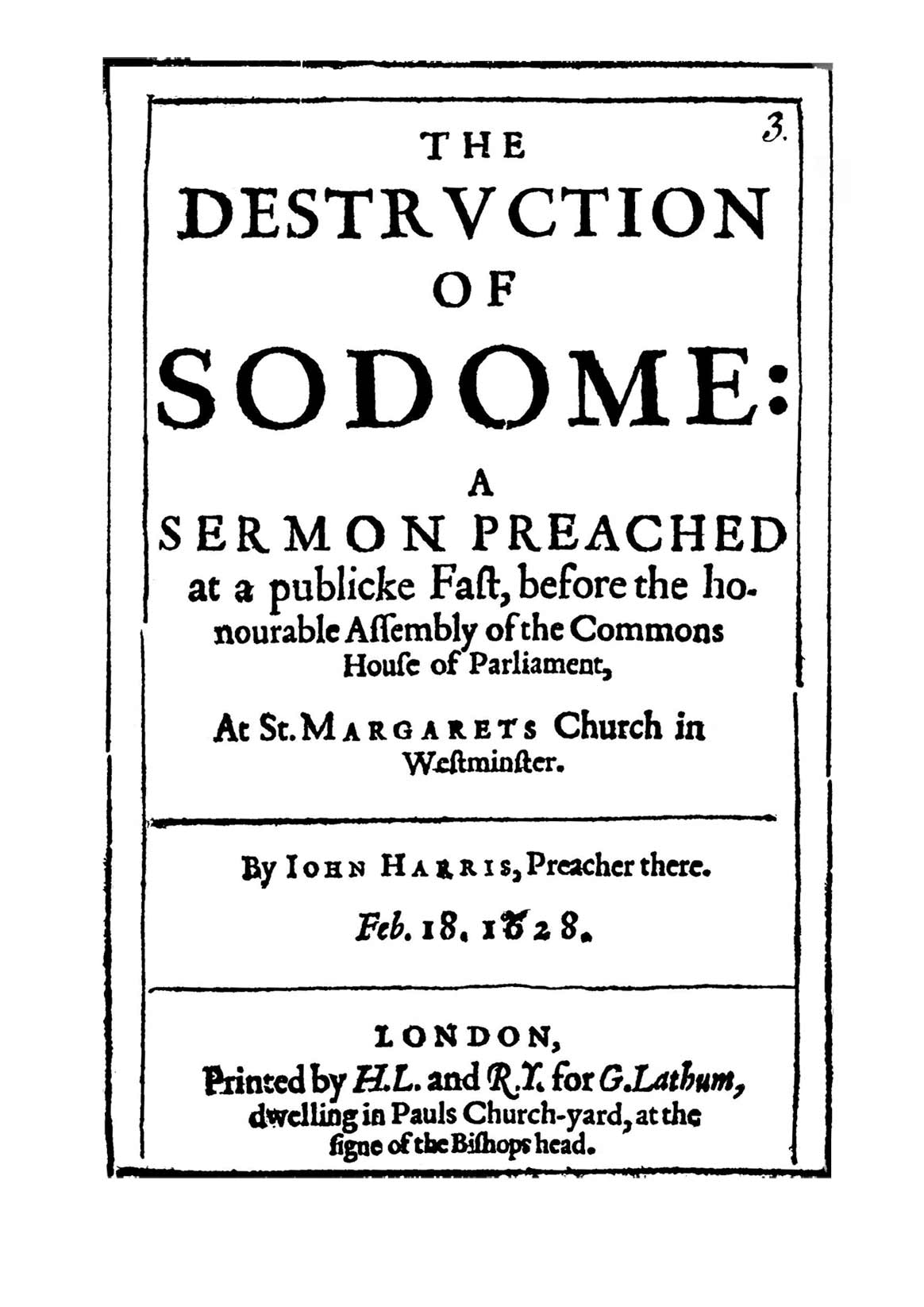
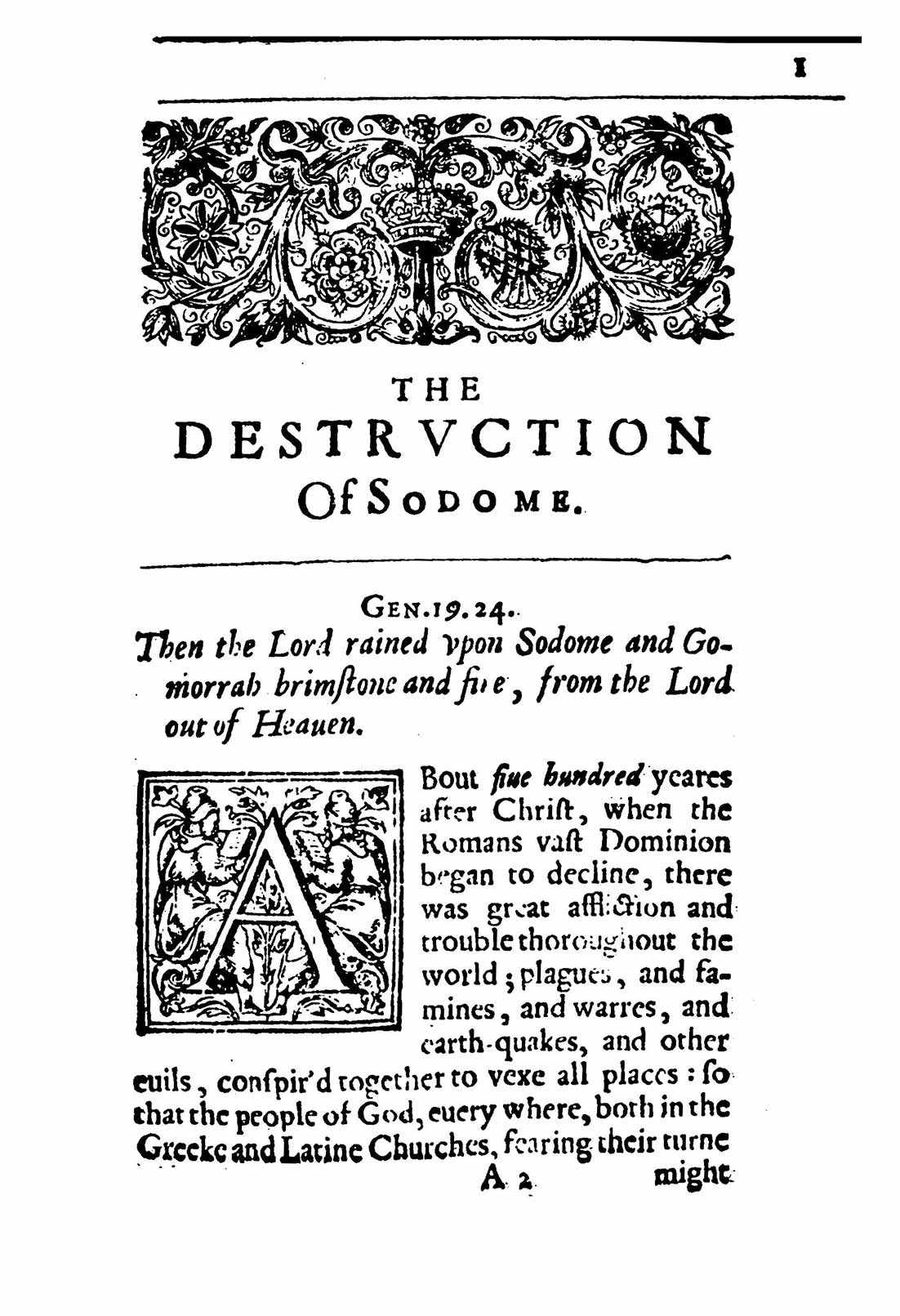
To help these exercises of repentance, the Word of God must be preached, the sins of a Nation must be ripped up, and God’s judgements against sin must be announced. Nothing does more to humiliation and compunction than a serious consideration of how iniquity infinitely angers God, and how severely he had, does, and will punish it. It was the course, which God himself directed the Prophet Jeremiah to run, when Israel and Judah were upon the point of destruction : This word came unto Jeremiah from the Lord, saying, Take thee a scroll of a book, and write therein all the words that I have spoken unto thee against Israel, and against Judah, and against all the Nations, from the day I spake unto thee, from the days of king Josiah, even unto this day. It may be, that if the house of Judah hears all the evil which I purpose to do unto them, that they may return everyone from their evil way, that I may forgive their iniquity and their sin. And in that scroll, say the Rabbis, was written the book of Lamentations : in which book, Jeremiah the Prophet in a most mournful Elegy laments the miserable condition, which Jerusalem was to come unto because of sin. I have resolved to follow that passage, and to speak unto you of a people whose damnable impiety brought upon them such a misery, the relation of which may cause to tremble all those who eagerly work unrighteousness, and to abhor and avoid their heavy sinning, lest it results in their own ruin and abasement as well.
Jer. 36. 1, 2, 3. Six. Sen. lib. 2. Bibl.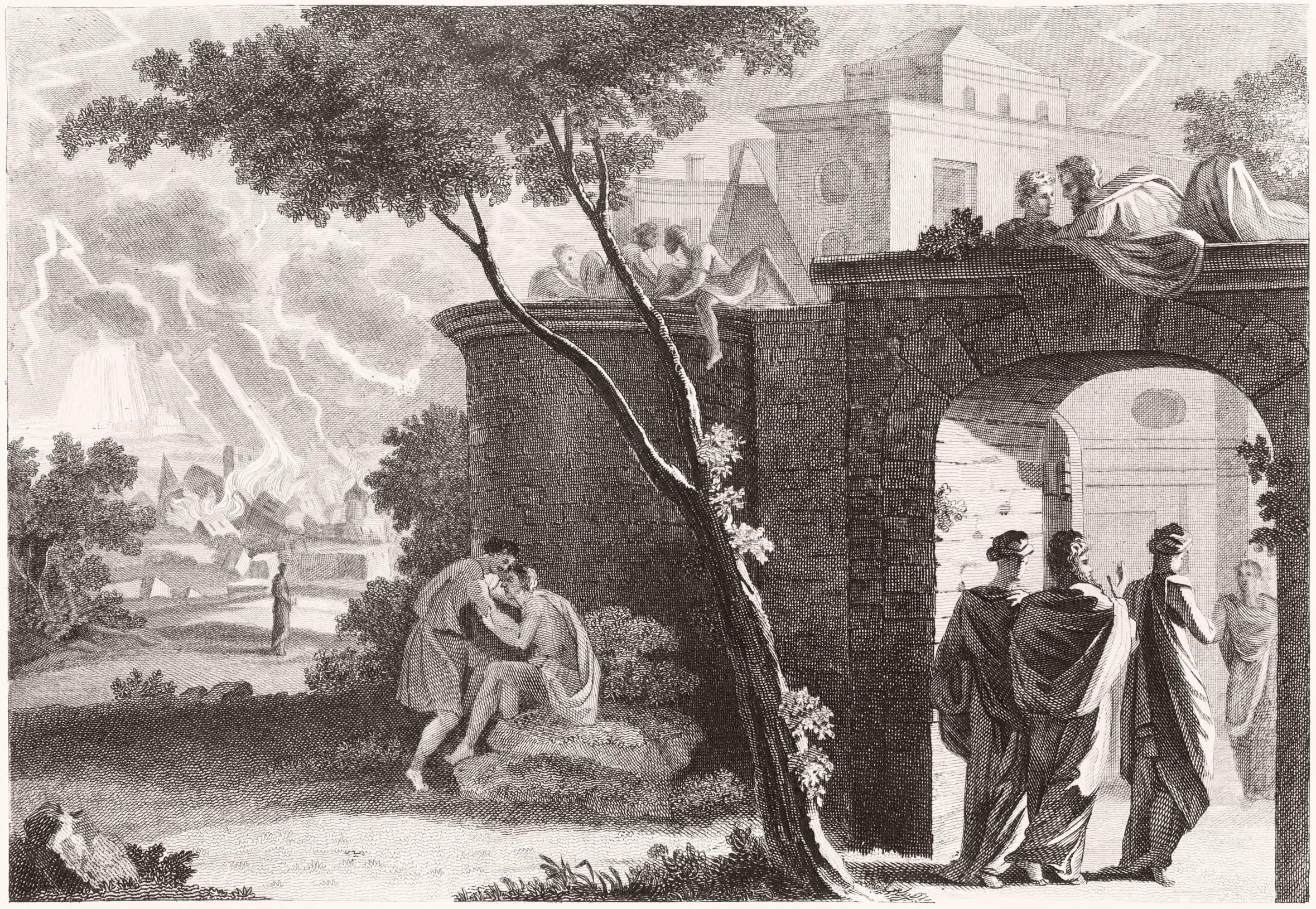
Genesis 19. 24.
Then the Lord rained upon Sodom and Gomorrah brimstone and fire, from the Lord out of Heaven.
You may please to observe in this verse the following details :
1. The event : it rained.
2. The agent : the Lord rained from the Lord. Or, the Lord the Son rained from the Lord the Father [ dominus filius pluit a domino patre
], an interpretation given at a Council held at Jerusalem in the time of Constantius the Emperour.
3. The substance which rained : brimstone and fire. The Lord rained from the Lord brimstone and fire.
4. The place from whence it rained : out of heaven. The Lord rained from the Lord brimstone and fire out of heaven. Or as Salvian says, the Lord from the Lord sent to a wicked people a hell from out of heaven.
Salvian, lib. 1. de Gub. Dei.5. The recipients on whom it rained, in this verse : upon Sodom and Gomorrah. In Deuteronomy, it says upon Sodom and Gomorrah, Admah and Zeboim. In Augustine, upon Sodom, Gomorrah, Admah, Zeboim and Segor. In Genesis, upon all the plain, upon all the inhabitants of the Cities, upon that which grew upon the ground.
Deut. 29. 23. Augustine, lib. 1. de Mirab. Script. Gen. 19. 25.6. The time when it rained : Then. Then the Lord rained upon Sodom and Gomorrah brimstone and fire, from the Lord out of Heaven.
The time provides an opportunity to discourse about the agent’s patience, and the recipients iniquity. The event and the substance allow us to treat of God’s severity, and Sodom and Gomorrah’s misery.
Therefore we will proceed as follows, God’s grace assisting :
-First, speak of God’s clemency, and of Sodom and Gomorrah’s impiety.
-Secondly, declare God’s fury, and Sodom and Gomorrah’s calamity.
I. Of God’s clemency, and Sodom and Gomorrah’s impiety.
There is no greater antipathy between any two natures in the world, than between the nature of God and that of sin : You may sooner reconcile fire and water, heat and cold, light and darkness, than God and Mammon, Christ and Belial, the holy Ghost and Dagon. God hates sin wheresoever he finds it, be it in Heaven or Earth, in Men or Angels, in the Elect or the Reprobates. Indeed his Mercy, his sweet blessed Mercy, to which mankind has ever been much bound, never ceases from calling him to treat Adam’s children with all possible favour. Like a relentless suitor, it does not stop imposing on him until he make her a promise, that he will not execute the fierceness of his anger ; if not for that, the world would hear more frequently from him than it does. But although mercy has much weight with God, yet it is not the only voice, and justice is heard as well : if the suspension of judgement yields no remorse in sinners hearts, then to take pity upon their own souls and please God, justice will request for God to render indignation and wrath, tribulation and anguish, upon every soul of man who does evil, to the Jew first, and also to the Gentile. Aquinas says that mercy is attributed to God according to the effect, not according to the affect of the passion : it does not transport him beyond himself, or cause him to forever close his ears to his justice, when that pleads for indignation.
Hosea 11. 9. Rom. 2. 8, 9. Aquin. p. 1. q. 21 3. 0.It is evident in holy Writ, that Mercy is potent with God, and has a great sway with him ; he will admit her mediation even for the most notorious malefactors in the world, if he can discern in them any hope of amendment. How long did he delay Sodom’s ruin, and what attempts did he not try to bring them back ? He sent Lot to preach to them ; then he stirred up four Kings to make war upon them ; then he gave them victory over her ; and when they had captured the people and were carrying them off into captivity, he pressed Abraham out to rescue them. This Abraham, then, divided himself against them, he and his servants by night, and smote them, and pursued them unto Hoba, which is on the left side of Damascus. He brought back all the goods, and also brought again his brother Lot, and his goods, and the women also, and the people. Thereupon when their sins had cried out for brimstone, then then flames & wrath went out from God, and he dispatched his ministering spirits to go down, and see whether the people truly behaved according to the cry which came up unto him. Then he protested to Abraham that if he could find ten righteous men there, the whole people would not be destroyed by him, for the sake of those ten. God’s goodness towards them exceeds all oratory to express, all cogitation to think ; he would have spared them upon any tolerable terms, and they could have made their peace upon any conditions whatsoever : God, I say, took no delight in their desolation. At last, when he saw that no preaching, no war, no captivity, no redemption from captivity, could produce any piety among them, Then the Lord rained upon Sodom and Gomorrah brimstone and fire, from the Lord out of Heaven.
Gen. 14. 15, 16. Gen. 18. 21. Gen. 18. 32. Micah 2. 2. Bertius, Tabularum Geog. Gen. 13. 13.Pride is a sin that made angels into devils, says Prosper of Aquitaine ; it is a sin that is the forerunner of destruction, as Solomon shows : humility goeth before honour, and a haughty spirit before a fall. In high esteem among them was a sin for which Seneca says the guilty will always have God at their backs to take vengeance on them for it [ Sequitur superbos ultor a tergo Deus
]; they were excessive beyond measure, which is a deadly iniquity ; a rich pleasure-seeker is a neighbour to the Devil [ dives epulo est parochianus Diabolo
]. The higher the men’s taste, the more outrageous the blood boils, and the harder task it is to resist concupiscence. Jesurun became fat and kicked ; thou art become fat, thou art grown thick, thou art covered with fatness ; then he forsook God that made him, and lightly esteemed the rock of his salvation.
Idleness, similarly. It was a capital sin in the laws of Draco, a sin that teacheth much evil, a sin that chokes virtue, nourishes pride, and frames a life fit only for hell fire. This sin which is rejected by the whole universe, abounded among them ; whereas all other creatures were perpetually in action, the trees growing, waters flowing, birds flying, oxen plowing, and the spheres moving, the men of Sodom were like a standing pond or one of Sodom’s salt-pits : stinking from all lack of movement. They also condemned the poor, which is a crying sin ; in the story of Lazarus, Dives was denied a drop of water to cool his tongue, being in hell in torments, because he denied a crumb off his table to allay Lazarus’ hunger, while living on earth in pleasures.
Sirach 33. 27. Augustin. Luke 16.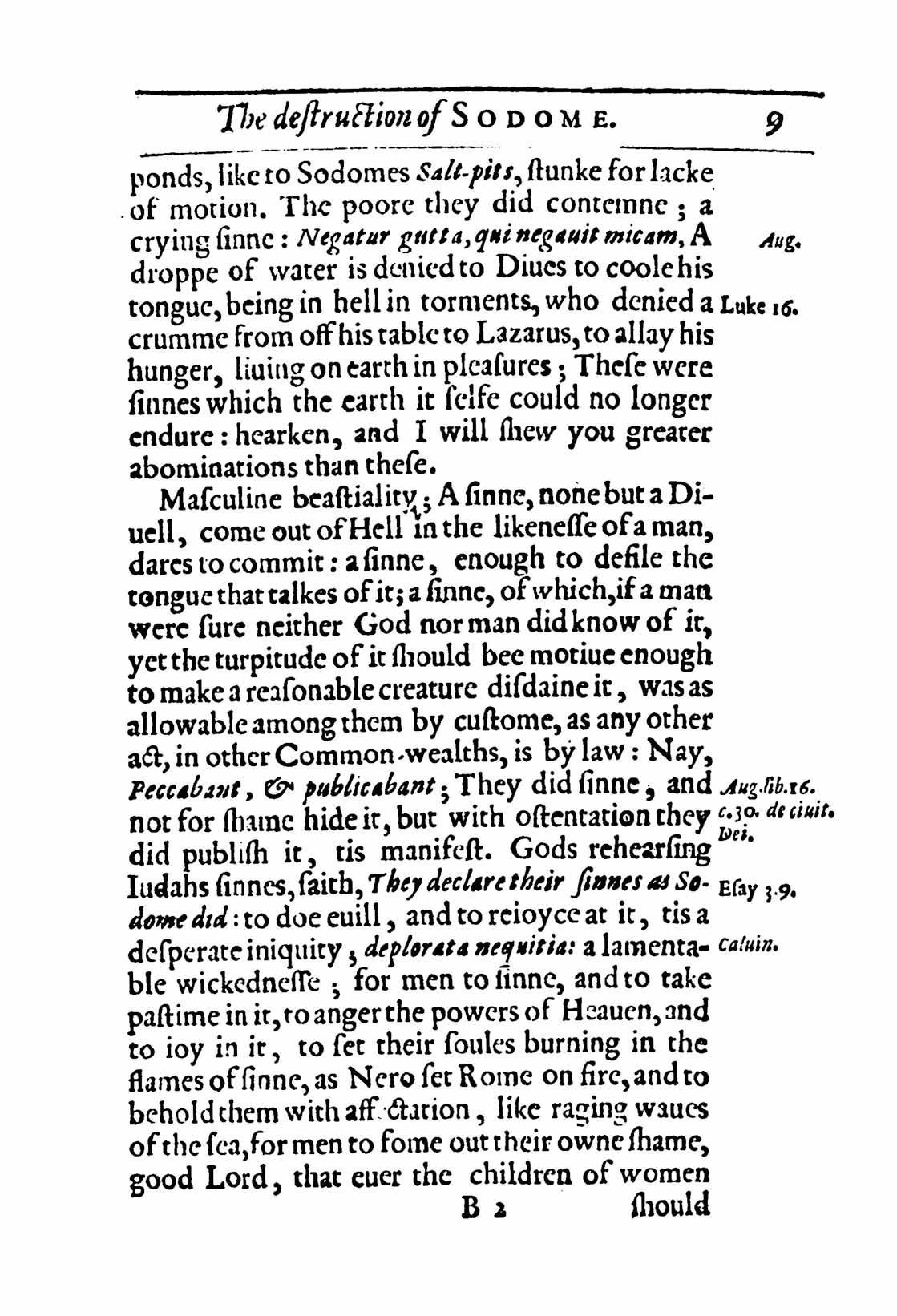
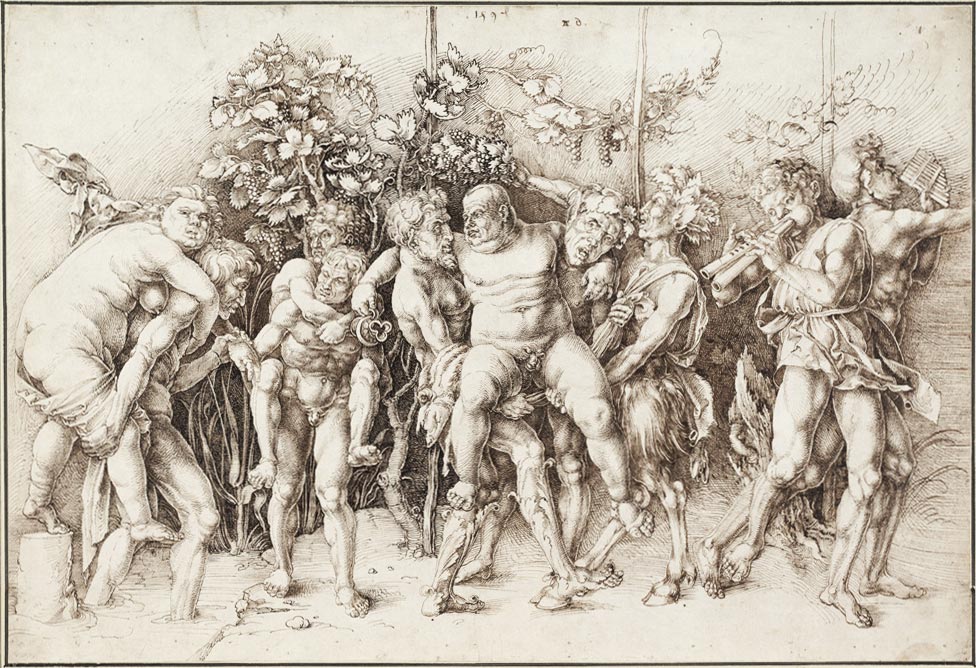
Furthermore, these acts of sin were entirely permitted and approved in the society ; everyone gave consent for the allowance of villainy, no one accusing, or condemning, or correcting, or deploring the iniquities that took place around them. Only Lot pleaded, I beg you Brethren, do not act so wickedly, and they attacked him for it : this fellow came in as a guest, but feels the need to be a judge. There was such a habit of filthiness, that unrighteousness was reputed for righteousness, and the one who condemned uncleanness was blamed more than the one who performed it. Their magistrates despite having regal power never asserted their authority, to pull them back from their beastly desires : And ( my beloved ) that is a daring sin, when the Magistrates, who should be like gods for the rest to imitate, are every jot as wicked as the people themselves ; they are inferiours pretending to be superiours. Thereby, those called to high stations in society, will either drag many to destruction along with themselves, or bring many into the way of salvation with themselves ; and this is what Fulgentius says to Theodorus a Senator of Rome : as the Judge of a people is himself, so will be his officers, and what manner of man the Ruler of a City is, such will be those who dwell therein. Now the rulers of Sodom were such that not only connived and winked at wickedness, but even accepted, nay preferred and even partook with the people in their abominations ; this was ominous and portended some dreadful judgement coming upon the whole Nation. When the vices of the populace are covered up and winked at by the rulers, they are reserved for the judgement of God. I would much rather see a blazing star burning down from the skies, than a wicked man in a position of power : an earthquake is not as destructive as a wicked Ruler.
Gen. 19. 7. Gen. 19. 9. Herodot. Fulgent. ep. 6. ad Theod. Sen. Sirach 10. 2. Jer. 51. 57. Aug. de Civit. Dei. lib. 4. cap. 2.All of these sins would be enough to turn any patience in a rage, and transform God’s mercy into wrath ; yet he continued to delay their annihilation for so long, that their sins grew enough to come bellowing up into Heaven, ready to impute partiality to his justice. Three hundred and forty years, according to the Chronology, passed between the drowning of the world with water, and the burning of Sodom with brimstone and fire, and during that whole time God was grieved with that generation. If they would have ever bethought themselves to alter their conditions, had there been but a sprinkling, a gleaning of good people in her, one honest soul for a thousand reprobates, God would have turned away from his intention. But in the end, when the Lord looked, nay sent down from Heaven, saw there was no hope, they were altogether corrupt and become abominable in their doings, there were none that did good, no not Ten ; Then the Lord rained upon Sodom and Gomorrah brimstone and fire, from the Lord, out of Heaven.
It is recorded that Julius Caesar never entertained hatred against any man so deeply as to be unwilling to relent if an occasion called for it ; the biographer gives an instance of this, that when C. Memnius ran for the election for the post of consul, Caesar befriended him more than other candidates, despite being previously much maligned by him. Our God, to whom all the Caesars & Kings of the world are tributaries and vassals, never hates so irreconcilably ( I take hatred as an intention leading to punishment ), that he won’t let a true humiliation to work a reconciliation ; indeed the pious are bothered by God’s long patience [ patientia Dei pios turbat
] , making them wonder how he can endure such palpable dishonour, and suspend vengeance. When David saw the prosperity of the wicked, he said that his feet were almost gone, his steps had almost slipped. And when the people of Nineveh had turned from their evil ways, and God repented of the evil which he said he would do unto them, and did not do it, it displeased Jonah exceedingly, and he was very angry. This clemency has hurt God’s reputation among the wicked men as well, and the damned Atheists use it to draw a conclusion against his omnipotence, saying that he is unable to banish all evil from of the world, since he does not do it. Averroes the Philosopher uses God’s clemency to make an argument against his providence, thinking that he does not bother with anything lower than the orbit of the Moon, because of his slowness to anger. In the ancient dialogue against Minucius Felix, the heathen philosopher Caecilius uses God’s clemency to draw a conclusion against his justice, saying that he is either impotent and unable to redress evils, or unjust and unwilling to rectify them.
In Psalms it is said, aHe doth prevent a man, through his blessing of goodness. In Lamentations it is said, bHe renews his kindness every morning. He must be called upon once, twice, thrice, to render vengeance : Lord, how long shall the wicked, how long shall the wicked triumph ; how long shall they utter and speak hard things ? It could even be said ( through a καταχρήσις
) that for our God to be cruel is a terrible burden, despite of how often the people impose it on him. cHis soul is grieved for the misery of Israel ; his dbowels are troubled for Ephraim’s sake. The rainbow is an emblem of God’s mercy ; people see it there in the clouds as if some man’s aiming at God, instead of what it is, God aiming at man. In Exodus, the location of the propitiatory Seat of Mercy, was an argument for his mercy : God commanded it should be placed over the Ark which contained the testimony and the book of cursings ; in this way mercy would be near at hand to pronounce sentence of absolution, when justice were at hand to denounce sentence of condemnation. e Of such infinite compassion was our Lord and Saviour Christ Jesus, that he would have pardoned Judas, if Judas had had grace to have asked forgiveness. Augustine says, f that some of those were forgiven, who had murdered Christ. In the 34. chapter of Exodus, where God himself lists adjectives to proclaim his nature, he begins with merciful : The Lord, the Lord God, merciful, &c. as if mercy had a priority in him. In the 116. Psalm, verse 5. he doubles the epithet merciful, Merciful is the Lord, and righteous ; yea, and our God is merciful : as if he had two quantities of mercy for the one of justice ; as if no act of justice could pass from him except through the gate of mercy.
Long patience is as it were God’s physical child with which the holy Deity were pregnant ; like every creature close to delivering a child desires to be rid of the burden, so does God desire to pour forth his mercy. Never has a wet nurse with breasts full of milk, been in greater pain for children to suck them, than God is in pain to have children to draw his mercy from him. Justice comes from God as a sting from a bee, reluctantly ; mercy flows from him as honey from a bee, most willingly. Mercy is as essential to him, as light is to the sun, or as heat is to the fire ; he delights in mercy as the faculties of our soul delight in their actions : the eye in seeing, the ear in hearing, or the memory in remembering. Patience, clemency, mercy, compassion, and peace, are the fruits of his bowels, the offspring produced by the very divine nature ; fury, rage, anger, affliction, war, and flaming fire, are forced upon him by the provoking exorbitances of the world.
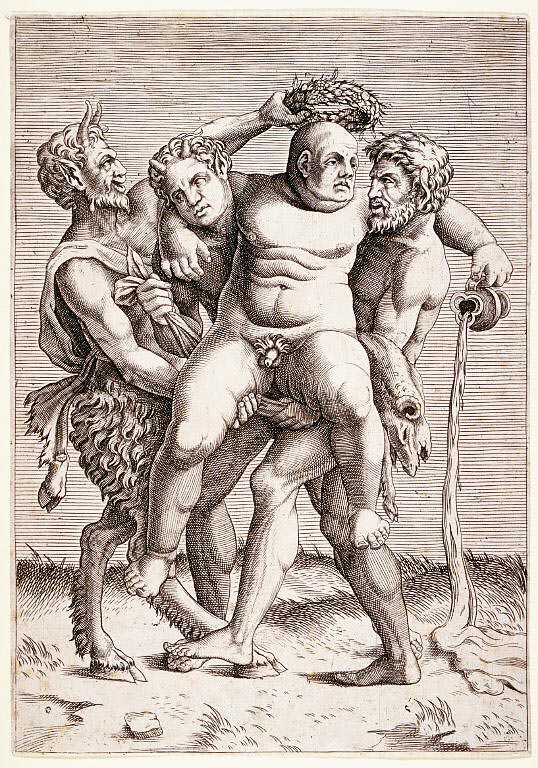
Throughout all of Scripture we even see God begging sinners to turn from their vicious courses ; the omnipotent Creator even turns beggar and pleads for his creatures to walk in his ways. Not that he needs for himself that all the world should worship him with a holy worship : A man who is wise may be of use to himself, but can any man be of use to God ? Is it any pleasure to the Almighty that thou art righteous, or is it advantage to him that thou makest thy ways perfect ? says Eliphaz the Temanite to holy Job. Our goodness does not extend to him ; he doesn’t require even man’s righteousness. Augustine writes, that a man cannot say he benefits the fountain by drinking from it, or the light by seeing with it, or that he benefits God by serving him ; all the worship man performs to God, is for man’s profit, not God’s. Because of all this, man must give a lot of thought to God’s long-suffering or μακροθυμία
, which endures millions of misdemeanours from mortal men, and by which he is infinitely dishonoured ; and to that free love which provokes him to seek man’s love, although he is by no means benefited from it. If a man is not a forged coin, if he has any remnants of Religion left in him, how can all this do anything other than enflame his soul to love the Almighty ?
God had put up with many a great dishonour, before he drowned the world in ancient times ; he patiently waited some 1500. years for them to amend their manners, before he began to affright them with any mention of a flood. Even after he had threatened a deluge, he gave them a delay of 120. years to change their courses, and gave them all that time for Noah to preach righteousness unto them. After all this, when the 1500. years were ended, and the 120. were expired, when the Ark was built and Noah and his family were aboard in her, yet he prolong’d the time seven more days before he broke open the fountains of the great deep, and opened the flood-gates of Heaven. And so for the people of Sodom : they dragged out of God their own destruction [ Ipsi
extorserunt ut perirent
]; their iniquities stood there like a mob of rebels, as if challenging Heaven to a battle, daring God and his Angels to do their worst.
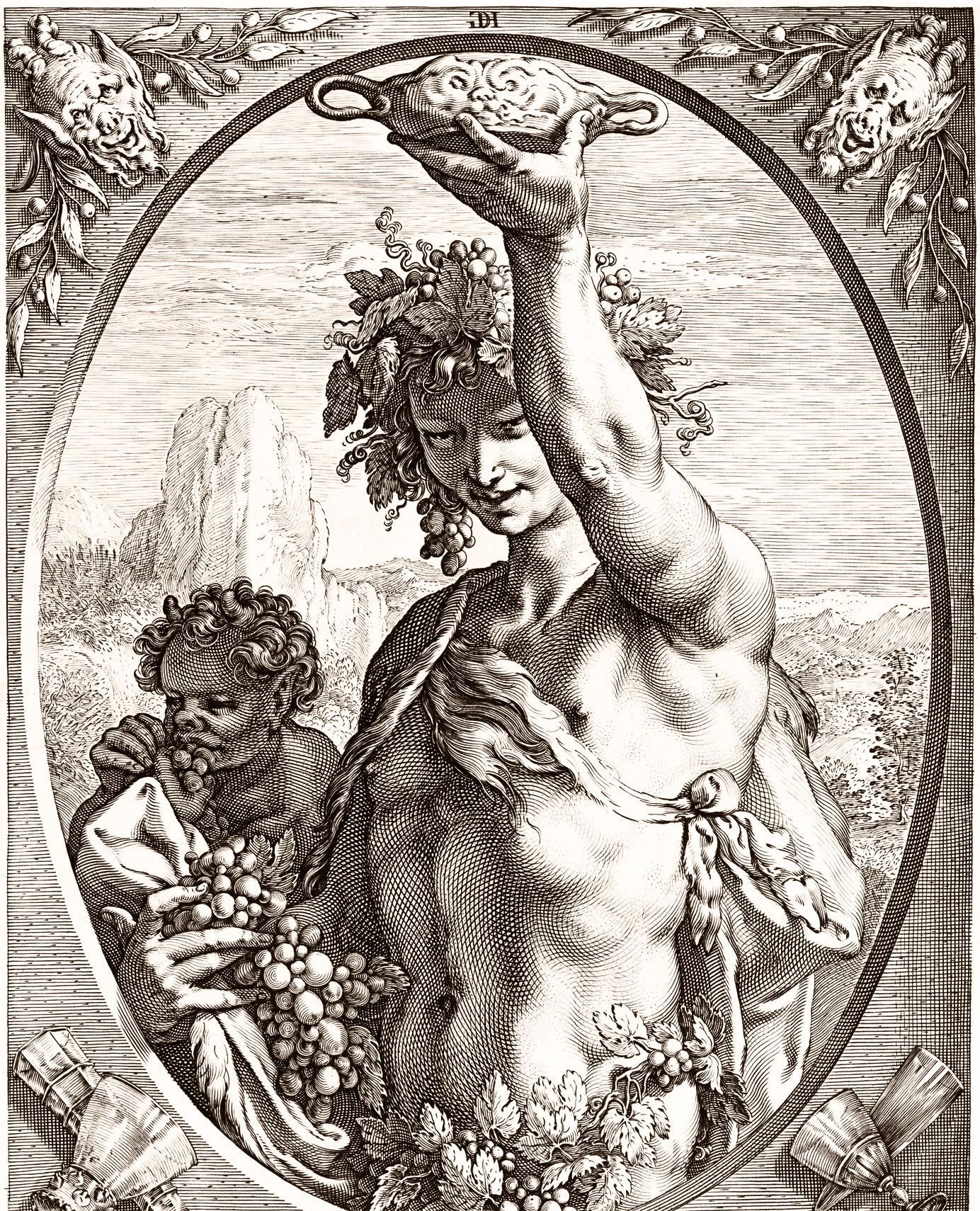
If you’d like, the Then in the verse can be taken as an answer to the When in the verse before it : When Lot was entered into Zoar, then the Lord rained upon Sodom and Gomorrah brimstone and fire, from the Lord out of Heaven. This extra circumstance shows us how dear is a righteous man in the sight of the Lord, for Sodom could not be burnt until after Lot was departed ; the Angel said to the Lot : Haste thee, escape to Zoar : for I cannot do any thing till thou arrive there. The Angel committed himself to be as provident in Lot’s preservation, as he was meticulous in Sodom’s destruction : Haste thee, escape thither : for I cannot do anything till thou arrive there. What he says here, the more I meditate upon it, the more I am amazed at it. St. Augustine mentions a report from Simplicianus, to whom a certain platonist said that these words of St. John’s Gospel deserved to be written in letters of gold : In the beginning was the word, and the word was with God, and the word was God, the same was in the beginning with God. The man said that those words deserved to be set up and read in the highest places of all Churches ; this passage was praised so highly because of being such a strong confirmation Christ’s divinity. Ambrose says it well : the word was ; it was ; it was ; it was : see St. John repeat that it was in the beginning, four times ; where does Arius find that it was not, in the beginning ? Something similar can be said for our verse : Haste thee, escape thither : for I can do nothing til thou be arrive there deserves to be inscribed upon every man’s heart, that God weighed the welfare of his servant so much, that he plainly stated he could not vindicate himself upon his foes, until his servant’s safety was assured. I am rapt to read it, & pray you all to take special notice of it. When Lot was entered into Zoar, Then, and not before then, the Lord rained upon Sodom and upon Gomorrah, brimstone and fire, from the Lord out of Heaven. I beg for you all to continually say, as the Psalmist does, Blessed is the Lord, who always has pleasure in the prosperity of his servant.
Gen. 19. 22. Aug. lib. 10. de Civit. Dei. c. 29. John 1. 1. Ambr. de Fide Cont. Arian. Psal. 35. 27.This observation may be also useful to the Wicked, and they may learn to respect the godly, because they fare the better for it. The world is a vast house of tiny people [ Mundus est magna homilli domus
], and the faithful are the columns and pillars to uphold it from ruin and confusion. They stand in the gap between the world and God’s wrath, as the chosen of Moses stood in the breach between the Israelites and God’s anger, when he was vexed toward them at the waters of strife ; his men stood in God’s way to turn away his indignation from the people, lest he should destroy them. In a family, a hired nurse is often treated better because of the child ; the wicked similarly fare better because of the children of God. When God searched for the ten righteous men to stand for Sodom’s sins, Abraham could have thrown in enough of his own people to save the place and its inhabitants from destruction. Yea Jerusalem itself, right before being destroyed, was offered to Jeremiah to be spared if even one man could be found even within it who executed righteousness. At such a high rate does God value one righteous man, that that one holiness will balance many a thousand’s wickedness. Good men are sanguis mundi, the blood of the world : when they die, one may fear the very world will perish soon afterward. When Eliah the Prophet was taken from the head of his servant Elisha and carried up into Heaven, Elisha cried out, My father, my father, the chariot of Israel, and the horseman thereof : As if to say, that Eliah was the only chariot and horseman to defend Israel, his holiness having such power with God as to hinder him from plaguing it ; and that he was now gone. If God goes out against a place to overthrow it, one just man is a better fort to defend it, than a rock of marble, or a bulwark of flint. For God a good man holds a great deal of interest ; he will come to parley with him, and will yield to him in any tolerable request.
God’s words to Moses on the mountain are proof sufficient to inform the Wicked of how much favor is held by a good man with the great God. At that time Israel had trespassed greatly, in turning the glory of the invisible God into a likeness of a grass-munching Ox, and by that Idolatry so angered Jehovah that he had a thought to confound them ; yet before he executed his plan, knowing that Moses loved them enough to make an intercession, and knowing from his own nature that if Moses intervened he could not choose but remit, the omnipotent God asked the frail human not to interfere : Now therefore let me alone, that my wrath may wax hot against them, and I may consume them. But when Moses was not dissuaded and still fell upon God to take compassion for Abraham’s sake, God bargained with Moses to let him alone : Let me alone, that my wrath may wax hot against them, and that I may consume them, and I will make of thee a great people. But nothing would stop Moses from being instant and earnest with God for their pardon, at which point the Text says, The Lord turned away from the evil which he thought to do unto the people. Here we have an example which could take a heart composed of hatred against God’s people, and turn it into gratitude.
Exod. 32. 10. Exod. 32. 10. Exod. 32.Nay, a later generation often fares better due to a good man from a former generation ; it was above 100. years between the reign of King David and King Joram, and yet though the impieties of Joram deserved to have his Kingdom torn away from him, The Lord would not destroy Judah for David his servant’s sake. Two hundred seventy six men had their lives saved from the shipwreck, on account of St. Paul : God gave him all of those who sailed with him, as the Angel said. The dissolute wretches therefore have a small reason to condemn good people, if they consider it : It was petty and unworthy for Haman to say to King Ahasuerus, that it was unprofitable for him to endure the Jews ; both the king and his kingdom fared better because of such inhabitants.
2. Kings 8. 19. Acts 27. Verse 24. Esther 3. 8.Make much of honest men, my Beloved ; make much of honest men : they are medulla mundi
, the marrow of the world, the strength and the bedrock of it. It would be quick to rip up the tares, if not for the fact that the good corn would be plucked up as well. So long as there are good men, it is possible that the world may endure : when once there is a general shortage of good men, then adieu to this present world for ever more. It is no surprise that Laban was so reluctant to part with Jacob, and would come to a new arrangement rather than let him quit his service ; he had learnt by experience, that the Lord had blessed him for Jacob’s sake. David cries out in the 12. Psalm, Help Lord! And why, what is the matter with David ? O the godly man ceaseth, the faithful fail from among the children of men. Is this something to be so exercised about ? Yes, the decrease of good men is inevitably a portent of something terrible ; Except the Lord of Hosts had left unto us a seed, we should have been as Sodom, and we should have been like unto Gomorrah.
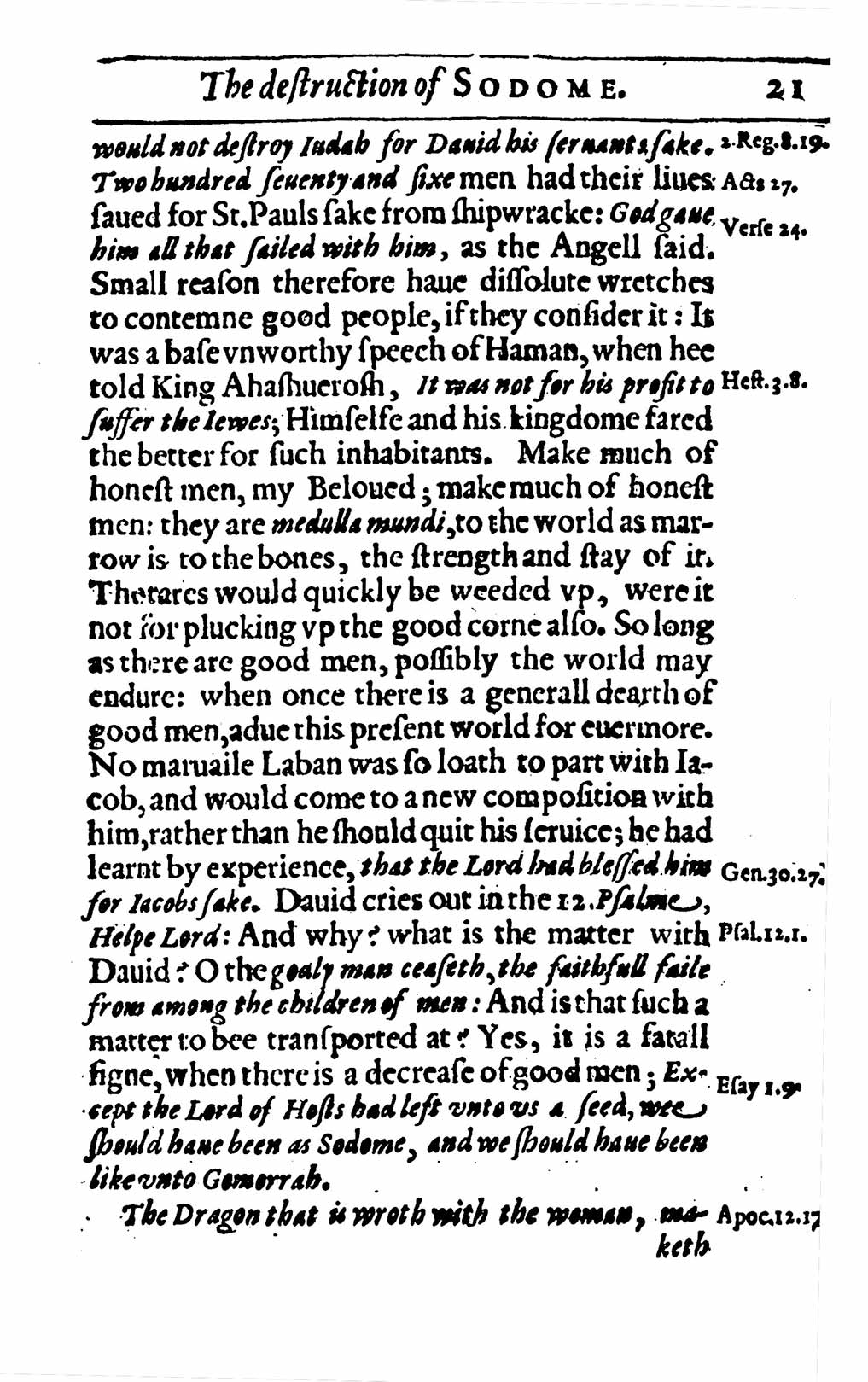

II. Of God’s fury, and of Sodom and Gomorrah’s misery.
But God is in no way more long suffering in his patience, than just in his punishment ; if men do not repent, then he will sharpen his sword. God spun out the thread of his love to an immeasurable length, to try whether the men of Sodom would grasp it ; sitting in heaven he went fishing for them, sent down the line of his love and strung his mercy upon it to see whether the people of Sodom would swallow it, that he might catch their souls. A long time passed before he boiled over ; his indignation was continually suppressed for many years, before it finally caught fire and grew to a devouring flame ; and when nothing else was left, Then the Lord rained upon Sodom and Gomorrah brimstone and fire, from the Lord out of Heaven.
Here, my Beloved, I will give you another observation : just as God is infinite in his suffering and will be repeatedly provoked before he breaks out into fury, so he is violent and fierce in the execution of his judgement once he has resolved upon it. The longer the archer draws his bow before releasing the arrow, the deeper is the shot that he makes ; the longer God takes before he pours forth his vengeance, the more it will scorch. I need not search other Chronicles for examples to verify this connection, because Sodom and Gomorrah ratify the truth of it. Strabo says that nature wrought this act, and that the fire which consumed these cities issued from out of the earth, but Strabo understood neither the Scriptures nor the power of God ; he is just a profane author, and we are not to credit his report. We have Moses and the Prophets, and we must hear them ; and they say The Lord rained upon Sodom and Gomorrah brimstone and fire, from the Lord out of Heaven.
Strabo, Geog. lib. 16. aTert. de Pallio. bvide Plin. l. 2. c. 52. Basilii Menologion Bedae. Exod. 9. 24. Arist. lib. 4. de cael. c. 5. Job 1. 16. 2. Kings 1. John 2. Job 37. 6.Alas, what became of the inhabitants ? What became of them ? they got dissolved ; every mother’s child they were all fried in brimstone flames. It is an awful judgement ; take it into your consideration, and wonder at it. On that morning the sun arose in its usual manner, it arrayed the whole plain of Jordan with its glorious rays, but before it rose to the meridian, the whole of Sodom was in flames [ tota rogus, regio est
]; her citizens burst into flame, her soil rotted with sulphur, and her vines and olive trees were blasted with filthy fumes. The earth yawned and swallowed those charred ruins of buildings, along with the ashes of the inhabitants. Those who previously boiled in lust, now boiled with fire ; God matched their strange lust with a strange fire, quenched the heat of their concupiscence with the heat of brimstone, filled their lungs used to savory meats with stifling smoke ; he consumed all, their bodies, their goods, their cattle, yea their whole territory with a shower of fire from heaven. A famous punishment ends an infamous life [ Infamem vitam famosa poena consumit
]. Some were smitten with blindness, and ran into the scorching flames rather than away from them ; others no sooner cried Fire, Fire, than their tongues caught fire to stop their clamour ; a man would leap out of the City and a sheet of fire like a swift messenger would chase after him, catch up, and execute the will of God upon him. Some leapt into water hoping it would rescue them from the fire, because of the natural contrariety between the two elements. But I will tell you a miracle, that as in the Egyptian plagues, fire and water were made friends together on that day : the fire continued burning in the water, forgetting its own qualities, and the water forgot her own quenching nature. On one street the hot tiles sprang from the flaming roofs, smashing on those who passed underneath ; in another lane the scalding lead dripped from the gutters, and landed on the hairy scalp of someone who persisted in their wickedness. Here was heard a hideous noise from the collapsing houses, there was heard a pitiful cry from people sorely tormented in that flame. The heavens thundered fearfully, the lightning flashed dismally, the brimstone burned unquenchably, the people shrieked universally, the cattle bellowed miserably, and God angered terribly, because they had sinned abominably. The flakes of fire, like Samson’s foxes with firebrands on their tails in the fields of Philistia, scoured thorough the fields of Sodom, Gomorrah and the adjacent cities, burning up the standing corn, with the vineyards and olives.
But despite all this, God’s anger was not satisfied, and the hand of his wrath remained stretched out still. As Christ cursed the fig-tree and said, Let no fruit grow on thee henceforth forever, so God cursed the land of Sodom and said, Let never inhabitant dwell in thee any more henceforth forever ; the children were burnt with their parents, so that not a trace of the blood of Sodom’s people could remain. Josephus writes that the whole huge army which Pharaoh led forth against the Israelites, consisting of 50000. horsemen and 200000. footmen, was so utterly defeated that there was not one left alive to carry home the news of the overthrow ; the Psalmist explains that The waters covered their enemies, and there was not one of them left. It was a fearful destruction in which not even one from such a multitude was able to return home, yet it was nothing like the destruction of Sodom ; although they lost many of their people, yet there were more Egyptians left behind to increase and multiply. Here it was an utter extirpation, an everlasting extinction of the whole race of Sodom’s inhabitants. The nurse burnt with the child at her breast, the mother melted with her babe in her belly, the father fried with his posterity in his loins, young men were dissolved to ashes, young maidens were consumed to cinders ; and not only those of a specific social standing, but everyone of every social standing ; all women that gave suck or were great with child, all who had been, were, or might be fit for procreation, of both sexes, male and female, of all ages, young and old, died in that dreadful fire. St. Ambrose says, the people profaned by one impiety, were destroyed by one condemnation [ quos una impietas prophanavit, una sententia delevit
]. He says this of those who perished by the Flood, and so say I of those who perished by this fire.
And yet despite all this, God’s anger was not satisfied, and the hand of his wrath remained stretched out still. God cursed the very climate, made it uninhabitable, had so altered the condition of the ground, that foreigners if they venture to plant a colony there, will be unable to find any means to manure it so that it shall bear fruit. It has Babylon’s curse ; It shall be no more inhabited for ever, neither shall it be dwelt in from generation to generation ; no man shall abide there, neither shall any son of man dwell therein. At one time it was the choicest seat under the sun, the very Paradise of the world, holding resemblance with the garden of the Lord ; corn, wine, and oil flourished there abundantly ; it was so fertile a soil, that people believed it to be God’s peculiar habitation. Martin Luther says that the cruel rain made it so barren that the ground lost its nutrition, could not be tilled, and the plowers could not tear it up into furrows to harrow-in any kind of grain. God cursed the earth because of Adam’s transgression, but not so that it shouldn’t bring forth thorns and thistles ; yet I have not found that even a thorn or thistle have been seen growing in Sodom’s soil ; it became only a breeding ground of nettles and salt-pits. God said that he would lay Babylon in that desolate taking, possessed only by doleful creatures like owls, dragons, and satyrs ; yet I have not heard even of the owl, dragon, or satyr dwelling where Sodom was, despite its neighboring the borders of Arabia which could spare plenty of such creatures to people it, if they did not disdain to make their nests in it. Jerusalem, for crucifying the Lord of glory, was so razed to the ground by Titus the Emperor, that those who came to see afterwards could scarcely believe that there was ever such a city as Jerusalem ; yet Zion has become a plowed field. Troy, for the perjury of Laomedon and the adultery of Paris, was burned to dust and ashes ; one Fimbria the next day went over all the ruins, prying and searching where any thing was standing, to raze that down also, and ensure that there would remain nothing standing ; yet today the grass grows where Troy once stood [ iam seges est ubi Troiae fuit
]. The Land of Sodom is like salt that has lost his savour, good for nothing ; the fowl will not fly in her air, nor the fruit will ripen in her valleys, nor the fish will spawn in her river. Within it is a pool of water which is called mare mortuum, the dead sea, because :
“… it can’t bring from its depths even the creatures with scale.”
“… nequit proferre aliquam de gurgite gentem squamigeram
.”
Yet this is not all : despite all this, God’s anger was not satisfied, and the hand of his wrath remained stretched out still. What happened so far was just the beginning of their sorrows, for there was an even worse doom still coming for these sensual men : What am I talking about ? Further fire and brimstone, but which brimstone ? that stream of brimstone spoken by Prophet, that everlasting fire, such as is prepared for the devil and his angels.
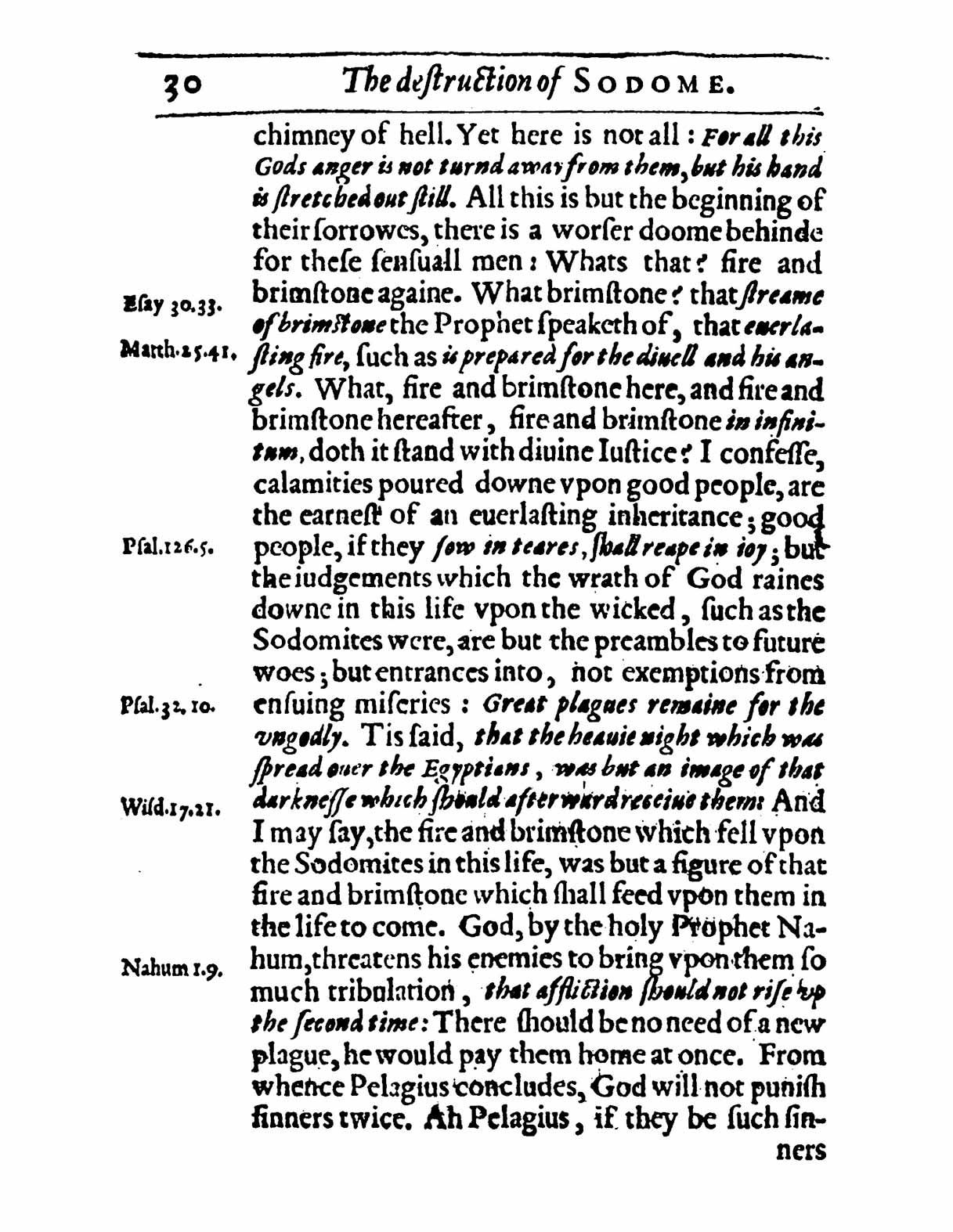
What, fire and brimstone here, and fire and brimstone hereafter? fire and brimstone in infinitum, does this correspond with divine Justice ? For good people, the calamities poured upon them are the pledge of an eternal inheritance, and everything they sow in tears, they shall reap in joy. But for the Wicked, the judgements which the wrath of God rains upon those such as the people of Sodom in this life, are but the preamble of their future woes ; a mere preface for, not the exemption from the ensuing miseries : great plagues remain for the ungodly.
Psal. 126. 5. Psal. 32. 10.It is said that the deep night which spread over the Egyptians, was but an image of the darkness which was to receive them afterward ; and I may add that the fire and brimstone falling upon the people of Sodom, was but a figure of the fire and brimstone which would feed upon them in the life to come. Through the holy Prophet Nahum, God threatened his enemies to bring upon them so much tribulation, that affliction would not rise up the second time : thеre would be no need for another plague, since he would pay them home at once. From this Pelagius concluded that God will not punish sinners twice. Ah Pelagius, if they were like the sinners described by the Apostle St. Paul who do not wish to retain God in their thoughts, as Sodom’s people were, then even annihilating their dwelling places and erasing them and their posterity would will not acquit and satisfy God’s justice ; a worse doom is still left : infinite extremity, devouring fire, and everlasting burnings.
Wisd. 17. 21. Nahum 1. 9. Rom. 1. 28.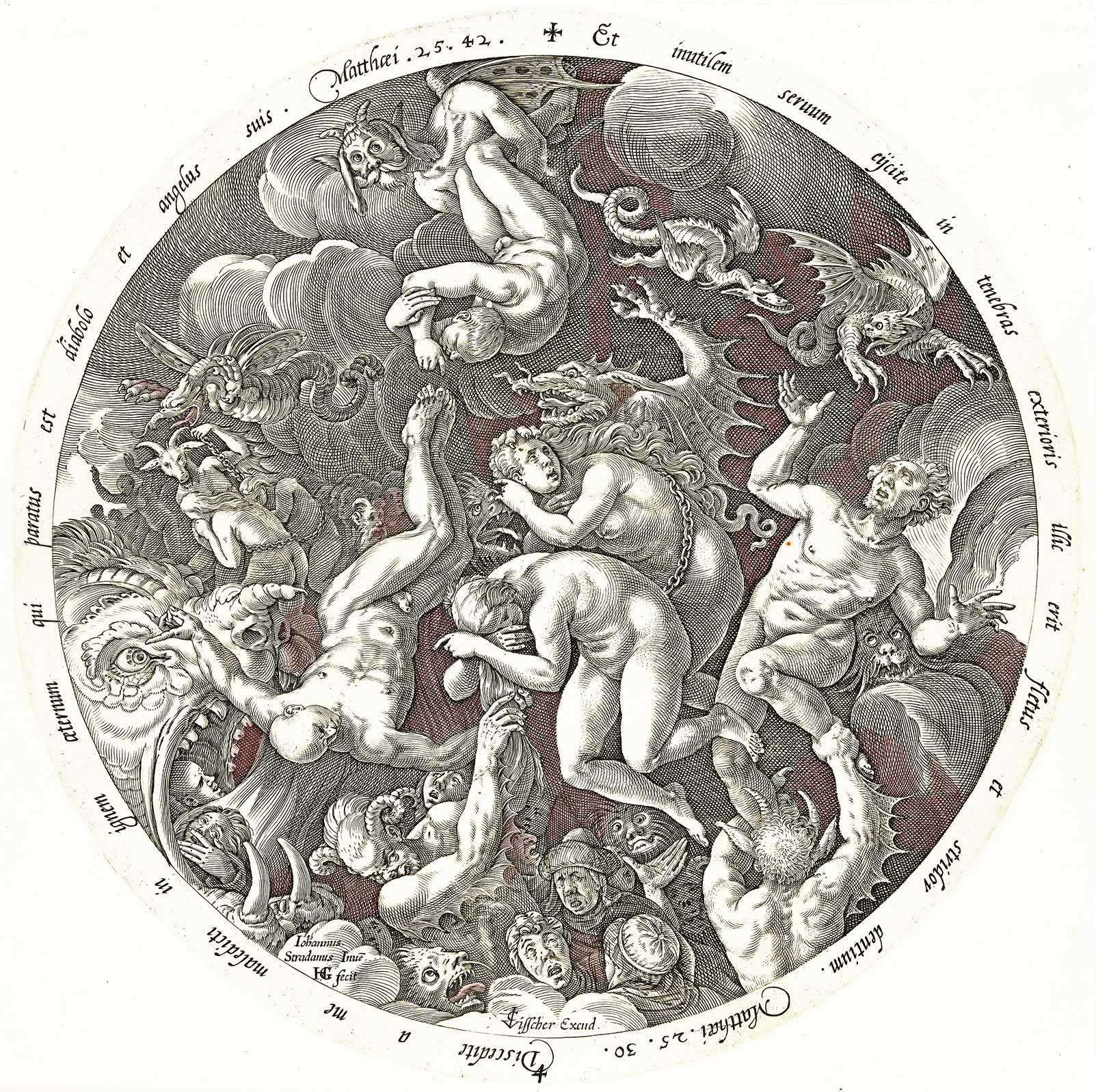
The people of Sodom suffer the vengeance of eternal fire. If the wicked could find a way to live forever, they would, in order to go on sinning forever ; therefore it is agreeable to God’s justice for their souls to never cease from misery in the next world, if they would never choose to cease from wickedness in this one. Let no man flatter himself in his heart because of the verse that says : God will not always chide, neither will he keep his anger for ever. Let no man reason that Man sinned for a stretch of time, and God will also punish him for a stretch of time ; rather let him know, that the one who sins against an infinite Majesty, must expect to endure infinite misery, if it weren’t prevented by infinite mercy. The one who neglects ineffable goodness, must look to be exposed to ineffable badness. Man through his sin destroyed that good which if he had kept it, would have made him eternally blessed ; and he loved that evil which not repented of, will make him eternally cursed, if it is imputed to him and not satisfied for by the blood of Christ. God does not measure sin by the quantity of time it is committed, and proportion the punishment accordingly ; if that were the case then a beastly Sodomite would have but a few minutes of torment ; God judges sin as Augustine says, by the greatness of the iniquity [ iniquitatis magnitudine
], and that is what he corresponds his punishment to.

III. The Application.
Job 31. 9. Judg 5. 28. 2. Thes. 3. 11.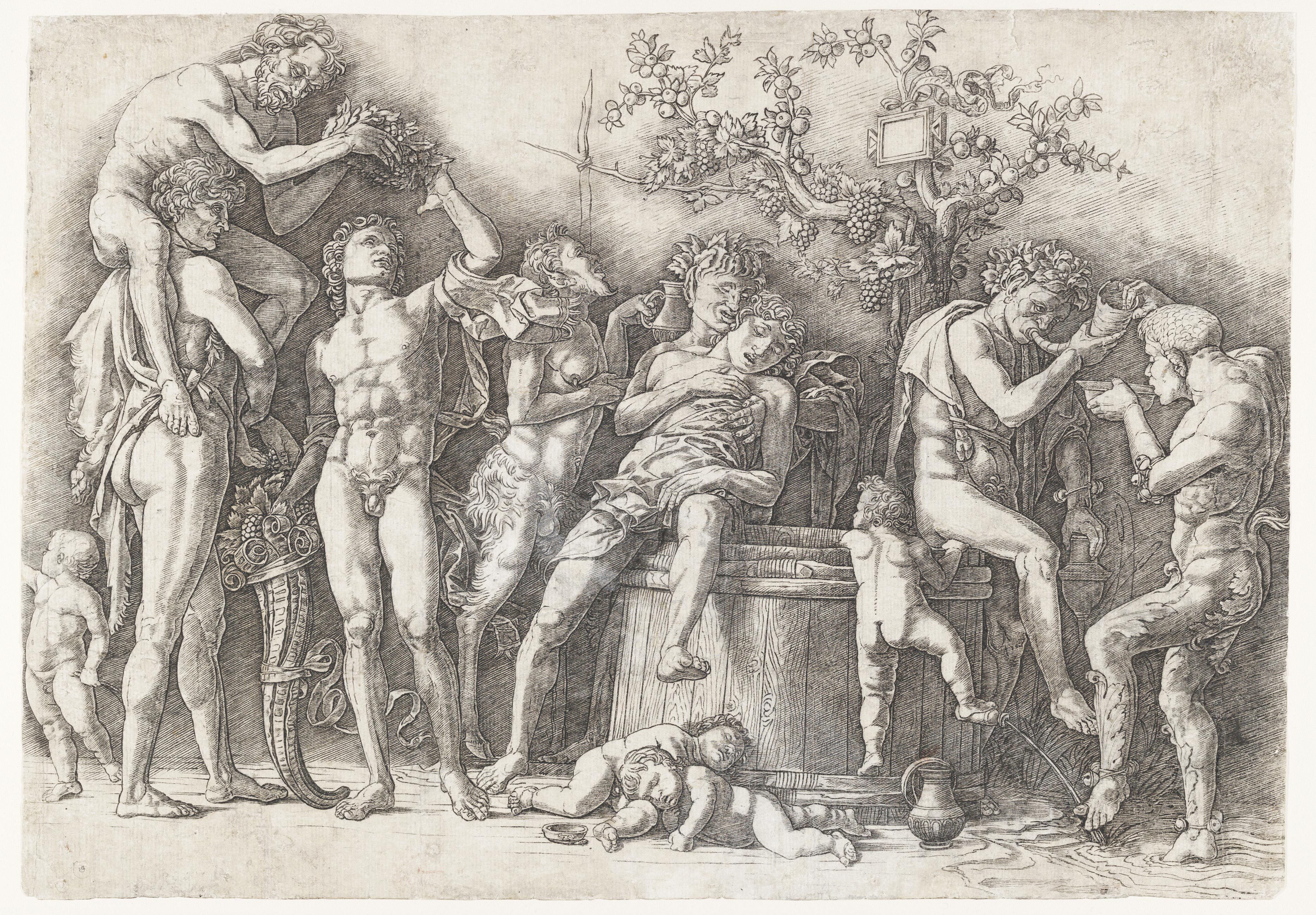
The men of Sodom Ate and Drank, says our Saviour. Behold the sin of voluptuousness. Take notice of the dress in the people of present times, and pay me no heed if you do not find us equalling if not outstripping Sodom in gluttony. If a ghost from the land of Sodom beheld any one of our feasts, it would say that our feasts far exceeded theirs. If a nation could be condemned for superfluity in fare, I do bewail this Land, in which I was born, and this City in which now I breathe ; good Lord, that you should give us so much, and we should have spent it so wastefully.
Luke 17. 28.The men of Sodom Bought and Sold. Behold the sin of covetousness. Did filthy avarice find a home in Sodom and did that cause her desolation ? then Lord be merciful to us, because we have many who out of relentless greed declared a marriage to the gold, and gave a bill of divorce to Jesus Christ! The Clergy of the Church ( as in Prosper’s generation ) make haste not to be better but to be richer, not to have more holiness but to have more recognition ; they forget St. Paul’s teaching to Timothy : No soldier of God will concern himself with worldly matters, but rather will seek to please the one who made him a soldier. The country gentry ( as in Augustine’s days ) are more upset at having a paltry farm, than a paltry life ; they forget the teaching of Solomon : Riches profit not in the day of wrath, but righteousness delivereth from death. The Nobles of the Court ( as in the days of Jugurtha King of Numidia ) , are so wasteful that they spend all their possessions, and so covetous that they will not let others to retain theirs ; they make no use of the Apostle’s precept : Owe no man any thing, other than to love one another. The Lawyers at the bar ( as in the days of Pope Eugenius ), greedy of filthy lucre, raise their honorarium so high that one should take our Saviour Christ’s counsel literally : If anyone is sued in the courts and loses his coat, let him give his cloak as well, rather than contend for his coat again. They never remember the speech of our Saviour to the Publicans : exact no more than that which is appointed to you.
Luke 17. 28. Prosp. lib. 1. c. 21. de vita contem. 2. Tim. 2. 4. Aug. de Civ. Dei. lib. 3. cap. 1. Prov. 11. 4. Rom. 13. 8. Bern. lib. 1. de consid. Matth. 5. 40. Luke 3. 13. Luke 17. 28. Gen. 10. 10. 2. Sam. 18. 18.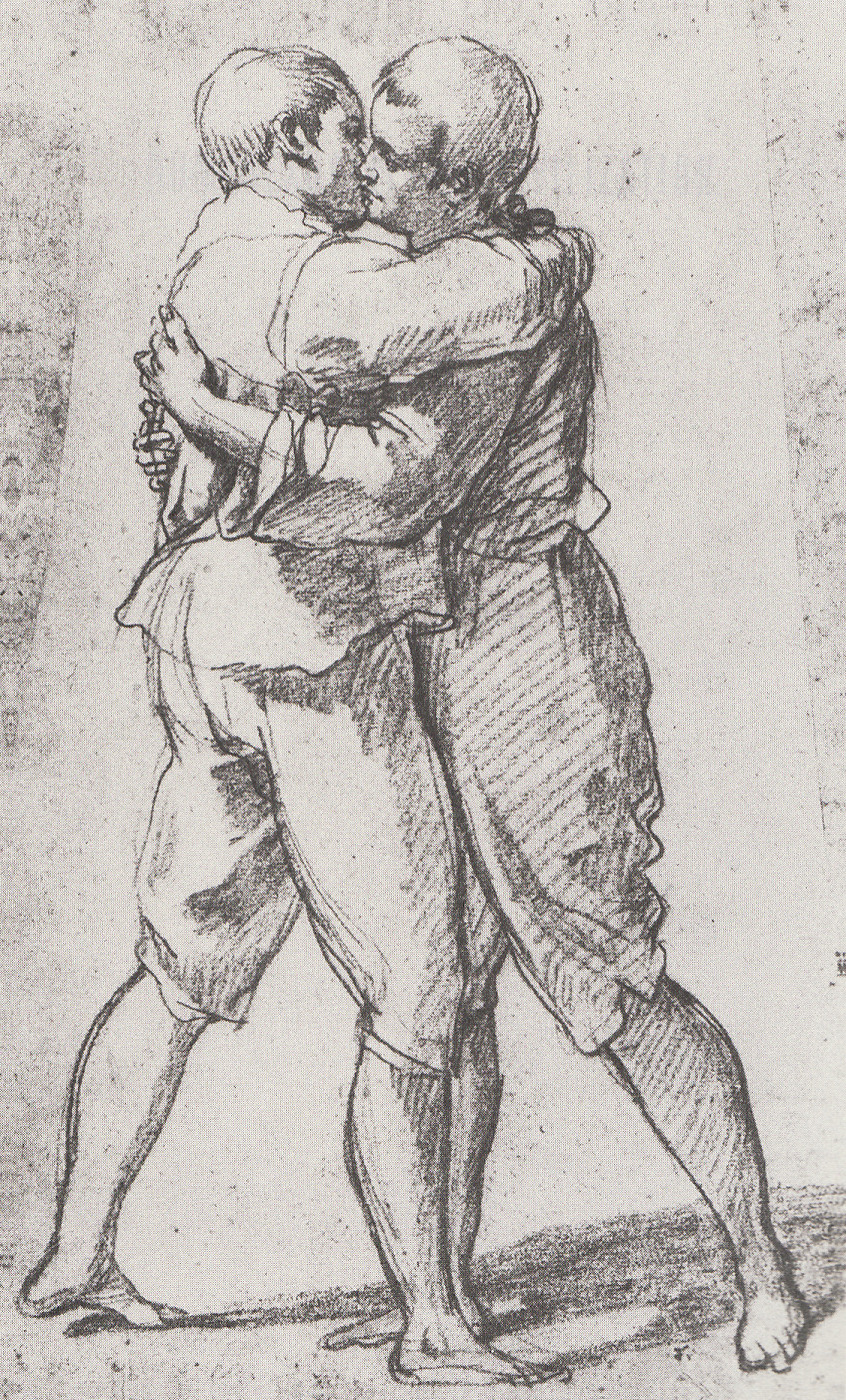
Nay, we are not free from that beastly sin of Sodom which cried to Heaven for brimstone, and because it rejoiced in doing evil, it cried the loudest. There is no greater sin than it which can be forgiven ( for what sin can be so deadly that the death of Christ could not heal it ? ), but I dare say it must receive an infinite measure of mercy, and an abundant measure of tears, in order to wash away. Yet among us it is a common, very common sin. When two men who partake of this sin meet together, take note that you will hear one of them boasting of his wickedness to the other, and then laugh at his beastliness, cheering up his heart at the repetition of his own ungodliness. O Lord, look down from heaven, behold and visit the world, and restrain the sons of men from this most grievous iniquity.
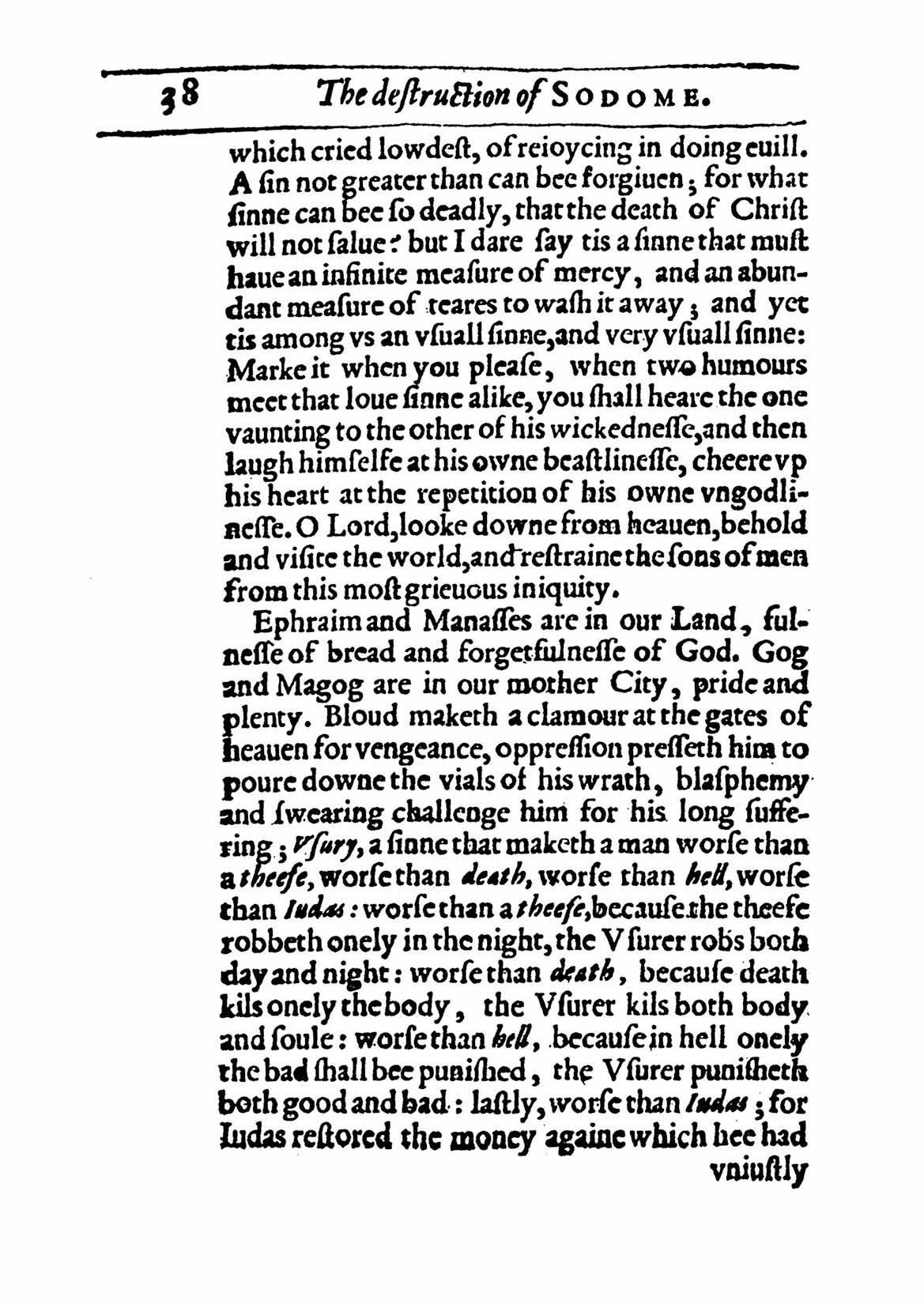
The times are grown monstrous ; there is discord in societies, fraud in merchants, corruption in officers, conspiracy in magistrates, simony in ministers ; every night brings forth a thief, every day a deceiver, every minute a drunkard, and every week a murderer. We are fallen into the times like the ones described by the Prophet : Our hands are defiled with blood, and our fingers with iniquity, our lips do speak lies, and our tongues mutter perverseness. There was never that vice reigned, but now it is rife, yea I think I may say it, and not belie the world. There are many new vices reigning now which Sodom and Gomorrah never heard of : there are new devices to cousin with, new fashions to be proud with, new oaths to blaspheme with, new merits to justify by, new Articles of Faith to believe, new Sacraments to receive, new gods found out to worship, and new Mediators to intercede. Fall to your prayers, and beg fervently of God to send that new heaven and new earth, wherein dwelleth righteousness, of which St. Peter speaks ; for this whole world lieth in wickedness, as St. John says. For my part, I despair it will never become better without being purged with fire.
Isaiah 59. 3. 2. Pet. 3. 13. 1. John. 5. 19.Ambrose says that No person of any age was free from wickedness in Sodom [ Nulla aetas erat culpae immunis
]; for the infants, whom nature yet denied strength to perpetrate actual iniquity, had desire ; and the old men who were decayed in strength, had eyes full of adultery ; they were all filled with every evil [ omnes omni malo replerentur
]. The men of Sodom surrounded Lot’s house, both old and young, all the people from every quarter ; not ten righteous persons could be found among many thousands of souls. The same is not true of this Nation, for I can find the strength to confidently say, as the Lord did to Saint Paul in a vision by night concerning Corinth : God hath many people in this City ; more in this Land, and may he daily add to their number. And as he said to Ezekiel the Prophet, in a vision concerning Jerusalem, There are some that sigh and cry for all the abominations that be done in the midst of us, and daily may he add to the number of those likewise. Nevertheless, when I estimate the multitude of people contained within our borders, and observe so many marching furiously after their own lusts, for so few who follow Jesus Christ, I am afraid of some vengeance approaching, because I do not know what the will of the Lord is, whether he will spare the place for their sakes. I lay as much upon God’s mercy as one could without wronging his justice ; he will not be moved to pour forth his vengeance, unless sinners superabound in vices. But when and where you find all iniquity planted, all rebellion against God reigning, all the crying sins rousting, you may take liberty to proclaim what you fear, salvation stepped aside, and winged destruction ready to seize upon that people for a prey.
Edward the Confessor, one of the last of the Saxon kings, said upon his deathbed that the wickedness of the English was complete and grown to the height, and the revenge and punishment thereof would shortly follow. I am reluctant to make unsuccessful predictions of any grievous calamity likely to come upon my native Country, and would rather promise the lengthening of tranquility, were it not that you and your sins would cry out upon me for flattery if I should. I wish with all my soul, that peace a may be within your walls, and plenteousness within your palaces. Long may you b wash your steps with butter, and may the rocks pour you outrivers of oil. Long may your c mouths be filled with laughter, and your tongues with joy. God bless your d victuals with increase, and satisfy your poor with bread. Send that e your sons may grow up as the young plants, and that your daughters may be as the polished corners of the temple. That your garners may be full, and abounding in all manner of store, and that your sheep may bring forth thousands and ten thousands in your streets ; that your oxen may be strong to labour, that there may be no invasion, no leading into captivity, no complaining in your streets. That you may dwell without fear, g every man under his vine, and every man under his fig-tree, having peace round about you, as Judah and Israel had. God h make the horn of our David to bud, clothe his enemies with shame, but on him let his Crown flourish ; make his seed to endure for ever, and his throne as the days of Heaven. All the good that ever was conferred of all Nations, I wish heaped upon you. People commonly said about Pericles, that Πειθώ
, Suadela, the goddess of eloquence sat upon his lips, so much did he win the hearts of the Athenians through the force of his Rhetoric. From the bottom of my heart I wish our words were made so powerful, as to woo all who hear us to convert from their sins, and to turn unto the Lord, that so we might never need to foretell of anger and wrath ready to descend from heaven : but sin has got an intolerable head and kindles in me a strong jealousy, that either the end of all things is at hand, to make a clean riddance of the wicked and their wickedness, or else that some bitter judgement is near ; it is near, and hastens greatly to scourge us for our iniquities.
I have no skill in prophecies, but do not take my words to be like the words of women reporting Christ’s resurrection, as ὡσεὶ λῆρος
, an idle tale. Do not altogether ignore my words as Lot’s sons in-law had disregarded his counsel ; when they heard him say that God would destroy that City, he seemed to his sons in-law as though he had mocked. I do not speak out of a sudden flash of undigested zeal, but has given it much thought, adding observation to observation. In fact I’ve been at war within myself in my meditations, about how to deliver my mind discreetly and christianly, to avoid the imputation of a Fanatic. But these times seem so egregiously sinful, vices of all sorts, bloody, beastly vices, so foully committed, and so little punished ; virtue so sincerely preached but so little practiced. I could hope to see a sudden amendment in everybody, but to be frank I am skeptical about that ; for can the Leopard change his spots, or the Ethiopian his skin ? no more can repent those who are accustomed to do evil. So if it is not widespread amendment, then it will be a swift and sudden punishment ; which if it does not come, it is only through God’s extraordinary mercy and unfailing compassion.
In our prosperity we can boast that we shall never be deprived, that God in his goodness has made our hill very strong ; our poor shall be satisfied with bread, and our children happy in our families ; those who mow corn shall continue filling their hands, and those who gather up the sheaves, their bosoms. Yet hear me, hear me, ye great men of the people, and hearken with your ear, ye that be rulers of the congregation. You may guard your provisions most frugally, replenish your stockpiles most abundantly, trade with foreign Nations for wine to fill your cellars, send into your valleys for wheat to fill your granaries, and remain careless of the Lord of Hosts, and his Vineyard whose rotten branches he chops off. If the harvest you care about is not the plentiful harvest of the Lord, if the weeding hook you use is not justice to chop the roots of vices, if the crops you collect are not your sins cut out in time ; then as surely as a Tabor is among the mountains, and as Carmel is by the sea, Thistles shall b grow instead of wheat, and cockles instead of barley. Your c fruitful land and shall be made barren, because of the wickedness of those who dwell therein.
Sirach 33. 18. a Jer. 46. 18. b Job 31. 40. c Psal. 107. 34.Again, Hear me, hear me, ye great men of the people, and hearken with your ears ye that be rulers of the congregation. You may give an order to cleanse your open streets from all annoyances that may breed an infection, and to purge your private houses from all scum and filth that may prove contagious. Yet if you do not exercise your authority to sweep away sin out of your lands, cities, villages, and private families, then take heed that a pestilence, morbus incognitus medicis
, a disease unknown to the physicians ( like the one which killed 70000. people in Israel in three days ) , will not creep into your own houses, to kill your wives out of your bosoms, and your children in your cradles, and make your merchans drop down dead in your streets, as they are trotting to the Markets. Dung in your streets will not breed a plague as fast as drunkenness in your houses, and an unlucky serpent will not poison a place as fast as a lucky whore.
Finally, Hear me, hear me, ye great men of the people, and hearken with your ears ye that be rulers of the congregation. You may order your battalion captains and platoon officers to gather your soldiers year after year, and to exercise them in the feats of arms. You may provide the horses described by Job that will not possess fear, or flee at the rattling of spears and the glittering of swords. You may rig up your shipping, and set out a Navy to sea, consult with each other on making fortifications and impregnable bulwarks that are impossible to be scaled, for the safeguard of your Country. You may use all the science, expense and wisdom your Nation can yield to entrench yourselves from foreign foes ; but if you do not take a course to quell the power of sin, then take care that God will not bring upon you an Army of men bitter and hasty as the Chaldeans described by the Prophet Habakuk ; fell as the Arabians called by Esdras a nation of dragons ; fierce as the Carnanians whom Esdras says rage in wrath like the wild Boar of the wood, having garments rolled in blood. These and others will waste your Cities with misery, Overturn, overturn, overturn them, ravish your wives, deflower your daughters, take no pity upon the fruit of your loins, even bloody their swords in the bellies of women great with child. They will burn down your Churches, and when the Ministers of the Gospel beg for their lives, shall answer them as Titus the Emperour said to the Priests of the Jews begging for their lives : The priests ought to perish together with their temples [ Decet Sacerdotes cum templis interire
]. Such foes will take those of you in the Laity, and in whole droves carry away as captives, forbidding you upon pain of death to look back upon the places where you dwelt, as the Romans forbade the conquered Jews to look back upon Jerusalem. And those whom they do spare, they will make pay an annual tribute for their heads, as the Italians do the Jews at this day. They will employ your children to murder those who gave them birth and rip out the faith from their places of birth, as the Turks do to their Janissary soldiers, who were once children of Greek families.
An unrighteous man will not consider this, and a fool will not understand it. In the Book of Kings, the captain that was trusted by the king of Israel, when prophecied by a man of God about the abundance coming their way, answered : Even if the Lord opened the floodgates in the skies, could this happen ? Likewise an incredulous spirit may object to me : Even if the Lord will altogether cast us out of his protection, could what I say really happen ? Are we not walled about with seas ? Have we not ammunition and weapons of war ? Have we not men of heroic dedication ? Why should we fear foreign invasion ? My beloved, the Kings of the earth, and all the inhabitants of the world would not have believed, that the adversary and the enemy should have entered into the gates of Jerusalem : and yet Jerusalem is a heap of stones. Let me say to you, O Merchant City and a market for the Nations, what the voice said to Phocas the Emperour : Although you build the walls of your palaces as high as heaven, yet if sin dwell in them, they may easily be entered by an enemy. And let me say unto thee, O thou careless Nation, as Nahum the Prophet does to Niniveh, to that great City Niniveh : Art thou better than the populous Thebes, which was situated among the rivers, that had the waters round about it, whose castle was the sea, and her walls were from the sea ? Ethiopia and Egypt were her strength, and it was infinite. Put and Lubin were her helpers. Yet was she carried away, she went into captivity, and her young children were dashed in pieces at the top of all the streets, and lots were cast for their noblemen, and all her great men were bound in chains.
Psal. 92. 6. 2. Kings 7. 2. Lament. 4. 2. Micah 3. 12. Nahum 3. 8, 9, 10. Jer. 50. 14, 15. Livius. Jer. 51. 31.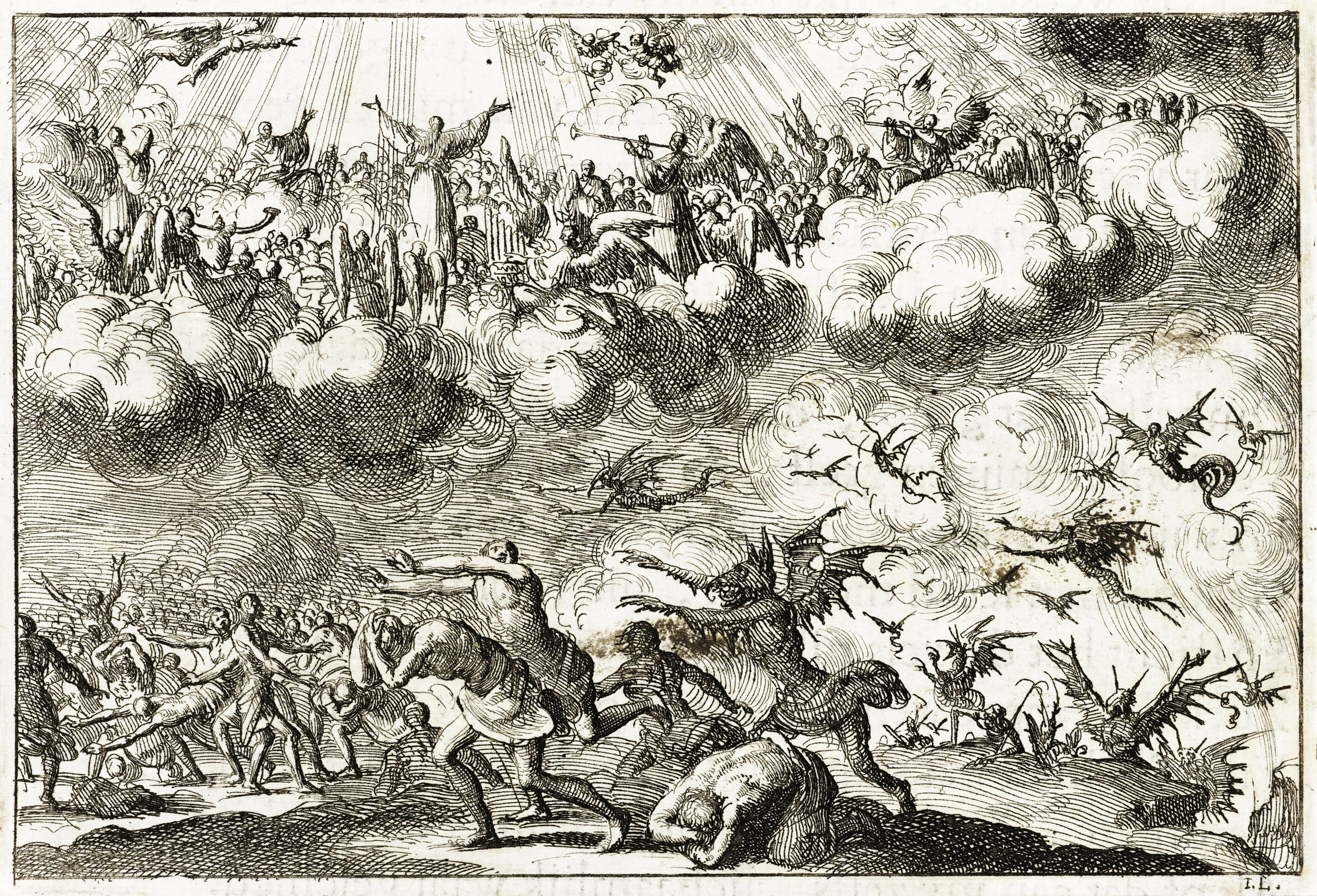
To draw everything to a conclusion, the ways to keep us from these fearful punishments are : fasting, prayer, godly sorrow for sins past, and the amendment of our sinful lives in the time to come. The fast the lord has chosen is not for a man to humble himself for one day, to only bow down his head like a reed and merely spread sackcloth and ashes underneath. No, as Augustine says, we sin perpetually, and therefore must needs repent incessantly [ Opus est perpetua poenitentia, quia perpetuo peccamus
]; we may drain our hearts dry of water today, but there will still be need to water our couches with tears tomorrow. Our grief for our sins must be equivalent, it must proportional to the delight we had taken in our sins ; our sins have been wondrous great, and our mourning must be marvelous deep : we have been out of measure sinful, and we must be out of measure sorrowful. We have sinned with greediness, and we must repent with bitterness ; we have been transported with delight in the commission of our sins, and we must be consumed with heaviness in our submission for our sins.
Ambrose writes that a man who has amplified his sin, must amplify his repentance ; greater crimes have to be washed away with even greater lamentations [ Qui culpam exaggeravit, exaggeret etiam poenitentiam
; maiora enim crimina maioribus abluuntur fletibus
]. People will run abominable races, perform such iniquities that make even the Angels of God wonder ; and when they have finished, each of them will say Miserere mei Deus
, Lord have mercy on me. But they will say it more out of custom than from the heart, like Saul who said to David going to battle Goliath, Go, and the Lord be with thee, and assume that that means they repented completely. O Lord God, that a man should dare to sin so damnably, and dream to rid himself of that guilt so easily! A bare Lord Have Mercy Upon Us will not do it, and there is more to repentance than that ; the faculties of our souls must be gripped with grief, wearied with groaning, and tired with supplications. We must double our words as Daniel does, and say, O Lord hear, O Lord forgive, O Lord hearken, and defer not for thine own sake, O our God. We must renew our complaints with David, evening, and morning, and at noon day, we must pray, and make a noise ; and God will hear our voice. We must weep and wipe our eyes, and weep again and wipe our eyes again, if we have loved many sins, before many sins can be forgiven us.
We must draw a conclusion in our own bosoms, that no Nation has been more bound to God than we, no Nation has sinned against God with a higher hand than we ; and therefore no Nation has greater cause to fast and weep, mourn and lament for their sins, than we. We must give way to the thoughts of our hearts, to reflect upon the distressed condition of the Church of Christ abroad. Remember that the bed does not protect the patient, or cradle the suckling babe, or pregnancy the woman, or the altar the Priest, or the justice-seat the Magistrate, from the fury of the merciless soldier. They may choose to fight back and will get surely killed, or yield and get executed, or flee and be pursued, or remain and be assaulted ; they could hide themselves and become hunger-starved, their corn fields devoured by troops of horses, and their rivers coloured red with the blood of men and beasts. In some places even their earth will be void, as if it were returning back into the Chaos, as written in Zech. 8. 10., there is no work for man nor beast, neither is there any peace to him that goeth out, nor to him that cometh in, because of affliction ; for all men are set, every man against his neighbour.
Zech. 8. 10.And yet we, a sinful Nation, a people laden with as much iniquity as any Nation in the Christian world, are having a rest : there is no battle chime heard in our streets, or desolation outside our gates ; our plowshares are not beaten into swords, nor our mattocks into spears. The enforcement of justice is not interrupted, the Word of God has a free passage, we lay us down to sleep and take our rest, God making us to dwell in safety. Compared with other people’s miseries, we must be mindful what ungrateful wretches we have been. Our sins do dishonour to our God who has, and does, follow us with so much loving kindness above others far more righteous than us ; we must earnestly repent, and be heartily sorry for our misdoings past, and we must swear unto the Lord, and vow a vow unto the Almighty God of Jacob, to renounce our evil ways, and to serve him in spirit and truth, in sincerity and with good conscience in the time to come. Then our God will not forsake us, nor give us up for a reproach, that strangers should rule over us ; but bless us all our lives long in bodies and souls, and entail the blessings more firmly than can derive from any law, to descend upon our posterity successively, so long as the Sun and Moon shall endure.
Jer. 51. 31.And to that purpose, let us pray unto him, and say, O most gracious God, let not our manifold sins make a separation between thee and us, let them not provoke thee to remove thy spiritual and corporal blessings from us. Give us, O Lord give us, broken hearts, contrite spirits, and bleeding souls, to offer up in sacrifice unto thee, that thou mayest be reconciled, and at an atonement with us. Our sins are great, Lord, we confess it, but thy mercy is greater, Lord, we believe it ; mercy therefore, dear Father, have mercy upon our King, upon our Queen, upon our Nobility, upon our Clergy, upon our Magistracy, upon our Commonality, upon our whole Land, for thy Zion’s sake, for thy Gospel’s sake, for thy beloved son Jesus Christ’s sake. Give, O Lord, give thy Angels charge over us, let them pitch their tents about us, that no pestilence come among us to devour us, no famine befall us to starve us, no sword of an enemy
my invade us to destroy us. And then O Lord our God, if thou wilt give us grace, we will bless thee, we will praise thee, we will magnify thee, we will sing songs of thanksgiving unto thee, we will ascribe all honour and glory unto thee, and to thy Son, our blessed Saviour and Mediator Jesus Christ, and to thy holy Spirit, to which blessed and glorious Trinity of persons, and but one God, be given all might, majesty, dominion, and praise, now and ever.
Finis.